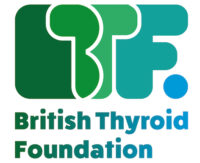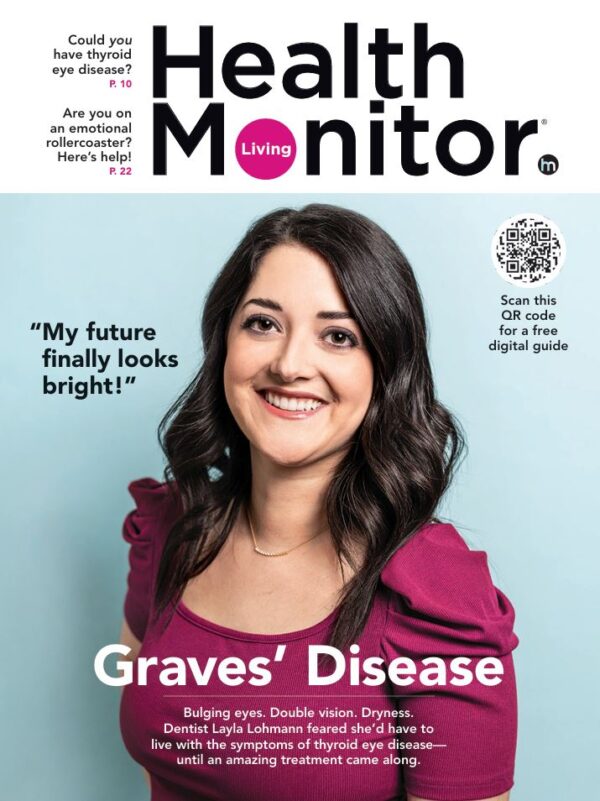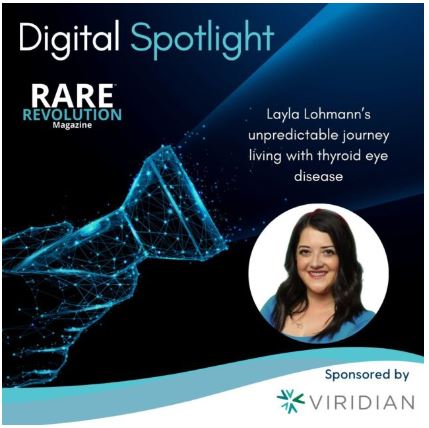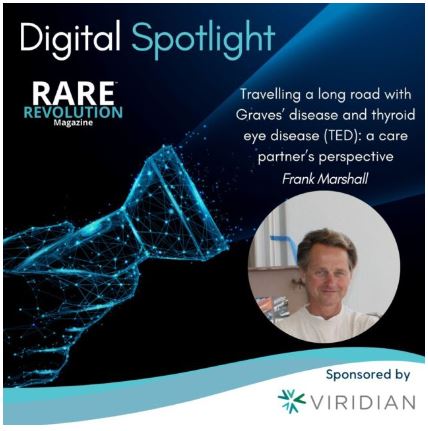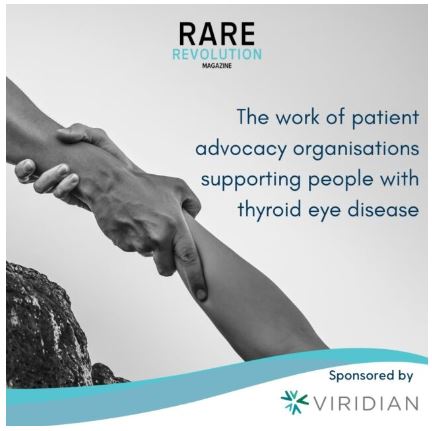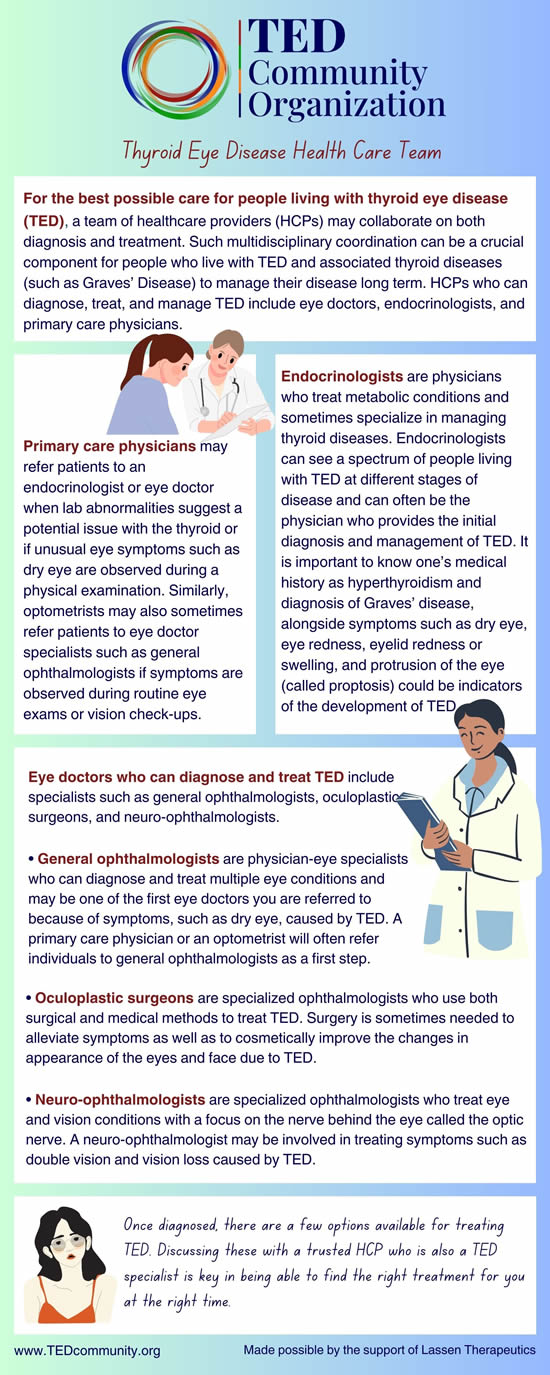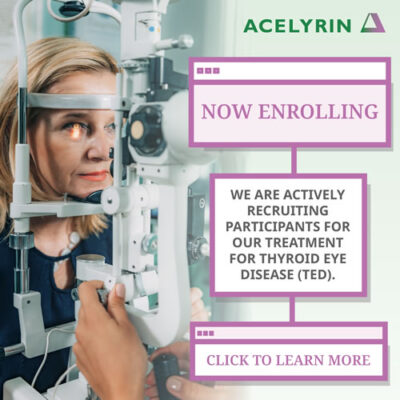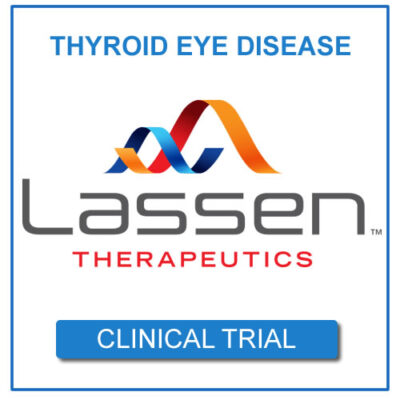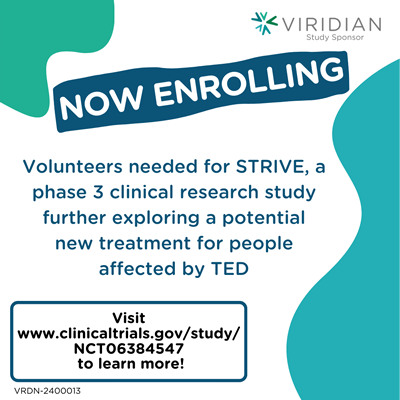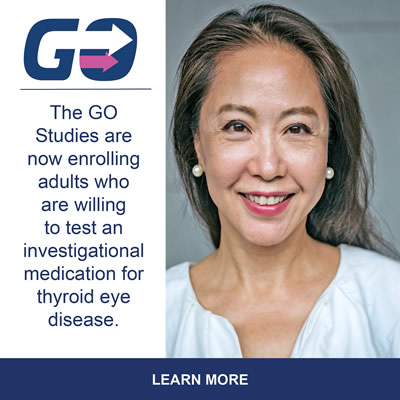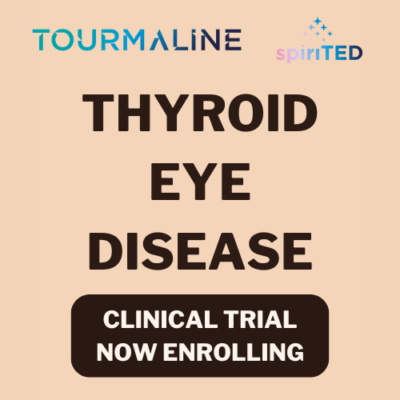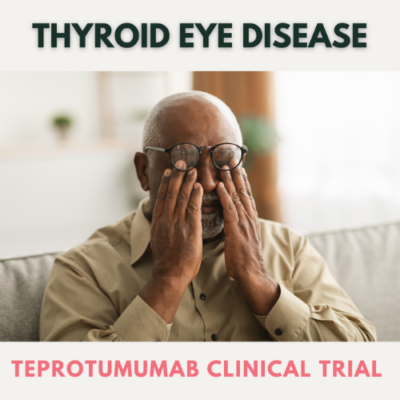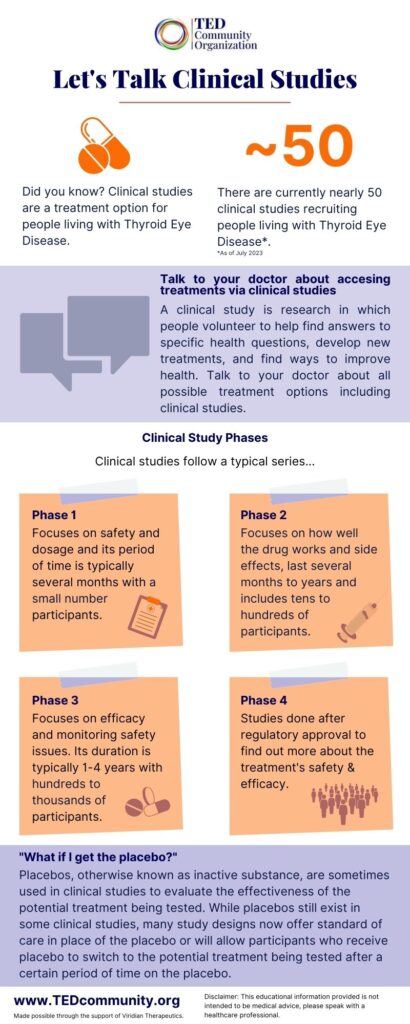Thyroid Eye Disease (TED) Research & Resources Library
Thyroid eye disease (TED) is an autoimmune disorder that affects the eyes and the surrounding tissues. It is commonly associated with Graves’ disease, but can occur in individuals with other thyroid disorders as well. TED can cause eye bulging, double vision, and eye pain, among other symptoms.
The research and resources below can provide valuable information and support for individuals with TED and their loved ones. It is important to work closely with a healthcare provider to manage and treat TED. Please review our TED Community disclaimer.
Learn about our friends in the UK!
Information specific to TED here.
Tepezza approved in Japan for active thyroid eye disease
Amgen announced that Tepezza(teprotumumab [Genetical Recombination]) was approved by Japan’s Ministry of Health, Labour and Welfare to treat active thyroid eye disease (TED) or TED with a high clinical activity score (CAS).
TEPEZZA is the first and only medicine approved in Japan to treat active TED.
Featured Thyroid Eye Disease Specialist
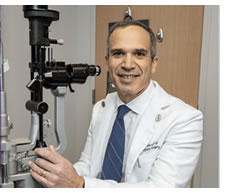 Alon Kahana, Md, PhD is an internationally renowned expert in orbital and ophthalmic plastic surgery at Kahana Oculoplastic and Orbital Surgery. This is a destination clinic for patients from throughout the Midwest and beyond, offering the latest surgical and non-surgical technologies and a deep understanding of this particularly dreadful disease process. Part of Dr. Kahana’s commitment to innovation includes the opportunity for patients to participate in clinical trials of novel medical therapies for thyroid eye disease. He also hosts regular patient-centered forums that help educate, engage and support patients and their families. We, at the TED Community, are particularly interested in Dr. Kahana’s comprehensive approach to treating the “whole person” and encouraging overall wellness of his TED patients. Please visit: https://DrKahana.com
Alon Kahana, Md, PhD is an internationally renowned expert in orbital and ophthalmic plastic surgery at Kahana Oculoplastic and Orbital Surgery. This is a destination clinic for patients from throughout the Midwest and beyond, offering the latest surgical and non-surgical technologies and a deep understanding of this particularly dreadful disease process. Part of Dr. Kahana’s commitment to innovation includes the opportunity for patients to participate in clinical trials of novel medical therapies for thyroid eye disease. He also hosts regular patient-centered forums that help educate, engage and support patients and their families. We, at the TED Community, are particularly interested in Dr. Kahana’s comprehensive approach to treating the “whole person” and encouraging overall wellness of his TED patients. Please visit: https://DrKahana.com
Featured Article
OPHTHALMOLOGY TIMES: How our Understanding of Thyroid Eye Disease (TED) Has Evolved
Our understanding of Thyroid Eye Disease (TED) has changed considerably over the last few years, driven primarily by new treatment options and research. This evolved understanding has prompted specialists in the field to reconsider the course of the disease and how to approach treatment. Read the full article here.
Here are a short list of resources related to thyroid eye disease (TED):
Find a TED Specialist Thyroid Eye Disease (TED) is a rare eye condition. And not all eye doctors (also known as ophthalmologists) have experience treating it. Make sure you’re seeing one that does. This TED Specialist page is maintained by Horizon Therapeutics.
The American Thyroid Association (ATA) is a professional association dedicated to promoting thyroid health and research. They have a section on their website dedicated to TED that includes information on diagnosis, treatment, and management of the disease.
Prevent Blindness offers well-rounded information about Thyroid Eye Disease (TED) as well as a TED Art Therapy program.
The Assistance Fund is an independent charitable patient assistance organization that provides support for adults and children with rare and chronic diseases. The organization may help provide families with financial and travel assistance. (Visit the TED page.)
American Association of Clinical Endocrinology (AACE). Founded in 1991, we are a global, inclusive community of more than 5,700 endocrine-focused clinical members, affiliates and partners from every walk of professional life. The AACE Journey for Patients With Thyroid Disease is your guide as you manage the complex, emotional, and often confusing experience of living with a thyroid condition.
Kellogg Eye Center provides a comprehensive overview of thyroid eye disease (TED) and, in a second article, discusses what to expect after you have received a diagnosis.
The National Library of Medicine offers articles and research about Thyroid Eye Disease (TED). This U.S. government website, noted as The National Center for Biotechnology Information, advances science and health by providing access to biomedical and genomic information.
PubMed is a database of medical research articles maintained by the National Library of Medicine. A search for “thyroid eye disease” will yield a wealth of research articles on the topic.
ClinicalTrials.gov is a database of clinical trials maintained by the National Institutes of Health. A search for “thyroid eye disease” will yield a list of ongoing and completed clinical trials related to the disease.
The Thyroid Eye Disease Charitable Trust is a UK-based organization that provides support and resources for individuals with TED. They offer information on the disease, treatment options, and patient stories.
Let’s Face It Together, is a nonprofit that provides renewed hope to those dealing with the physical and emotional challenges caused by facial alterations resulting from cancer, autoimmune disease, spousal abuse, accidents and other tragedies. LFIT fills the void between health insurance coverage and patient care.
Patients Rising. Formed in 2015, Patients Rising has developed a significant following of over 110,000 patients and caregivers and has guided more than 25,000 of them on their journeys to advocate for themselves and their loved ones to get the care and treatments they need to live a fulfilling life.
Patient Helpline. Our patient education and support platform provides direct, personalized access to information and a network of public and nonprofit programs and resources. Here you’ll find reliable, expertly curated information via our learning modules which include traditional content, videos, ebooks, webinars, podcasts, and infographics.
Recent Thyroid Eye Disease (TED) Research and Clinical Trials worth noting:
RECRUITING: A Trial to Investigate Teprotumumab Subcutaneous Administration Compared With Placebo in Male and Female Adult Participants With Moderate-to-severe Active Thyroid Eye Disease.
https://clinicaltrials.gov/study/NCT06248619?term=NCT06248619&rank=1
If you’re struggling with bulging eyes and are seeking potential new treatment options, you might be eligible to participate in a clinical research study for teprotumumab. You could possibly gain access to the study medication free of charge through this research opportunity. https://lpcur.com/TEDCo
![]()
![]()
ACELYRIN is currently recruiting for a clinical study designed to evaluate lonigutamab in subjects with TED. Use this link to learn more.
![]()
![]()
Tourmaline Bio is currently enrolling in the spiriTED Study – A Phase 2b clinical study investigating study drug TOUR-006 in patients with TED. Please visit – https://clinicaltrials.gov/study/NCT06088979 or https://lpcur.com/TEDCommunityOrganization for more information.
![]()

Genentech is currently enrolling for their TED research study and are inviting interested patients to check their eligibility. The investigational treatment is a subcutaneous injection that aims to provide relief for symptoms of TED like eye bulging and double vision.

Lassen Therapeutics is currently recruiting for 2 clinical trials evaluating a novel treatment for people with TED.
LASN01-CL-2201
Phase 2 clinical trial exploring LASN01 as a potential treatment for people with active TED
https://clinicaltrials.gov/study/NCT06226545?term=lasn01&rank=1
LASN01-CL-1101
Phase 1 clinical trial further exploring LASN01 in people with active TED or idiopathic pulmonary fibrosis (IPF)
https://clinicaltrials.gov/study/NCT05331300?term=lasn01&rank=2
![]()

Clinical Trial – A Study of Efgartigimod PH20 SC Given by Prefilled Syringe in Adults With Thyroid Eye Disease (UplighTED)
Condition – Thyroid Eye Disease
Official Title – A Phase 3, Randomized, Double-Masked, Placebo-Controlled, Multicenter Study to Evaluate the Efficacy, Safety, Tolerability, Pharmacokinetics, Pharmacodynamics, and Immunogenicity of Efgartigimod PH20 SC Administered by Prefilled Syringe in Adult Participants with Thyroid Eye Disease
Intervention – Combination Product: Efgartigimod PH20SC and Placebo
Delivery – subcutaneous injection
Total Number of treatments – 24 weeks; Open-Label Extension study available
Time between treatments – 1 week
Recruiting – Now
Recruiting – 108 participants
NCT Number: NCT06307626
EU Trial (CTIS) Number: 2023-509198-22-00
Study Name: UplighTED – ARGX – 113-2301; ARGX – 113-2309

- STRIVE
- Phase 3, Randomized, Controlled, Safety and Tolerability Study of VRDN-001 for people with active or chronic TED
- Ct.gov https://clinicaltrials.gov/study/NCT06384547
- Recruiting
- THRIVE
- Phase 3 clinical study further exploring VRDN-001 as a potential treatment for people affected by active TED
- Ct.gov https://www.clinicaltrials.gov/study/NCT05176639
- Active, not recruiting
- THRIVE-2
- Phase 3 clinical study further exploring VRDN-001 as a potential treatment for people affected by chronic TED
- Ct.gov https://www.clinicaltrials.gov/study/NCT06021054
- Active, not recruiting
![]()
![]()
Immunovant is presently recruiting for a TED clinical research study. Please use this link to learn more.
See “Understanding Thyroid Eye Disease” contributed by Immunovant.
Immunovant announced two new development programs for the drug batoclimab, including one for Graves’ disease.
![]()

Sling Therapeutics is now recruiting participants for a Phase 2b study to evaluate a new oral treatment for TED.
Thyroid Eye Disease / TED Studies
AMGEN TO SUBMIT TEPROTUMUMAB MARKETING AUTHORIZATION APPLICATION TO THE EUROPEAN MEDICINES AGENCY
April 26, 2024 – Amgen (NASDAQ:AMGN) today announced the imminent submission of a Marketing Authorization Application (MAA) to the European Medicines Agency (EMA) for teprotumumab, a fully human monoclonal antibody and targeted inhibitor of the insulin-like growth factor-1 receptor (IGF-1R), for the treatment of moderate to severe Thyroid Eye Disease (TED) in adults. TED is a serious, progressive, debilitating and potentially vision-threatening autoimmune disease that can cause proptosis (eye bulging), diplopia (double vision), eye pain, redness and swelling. If approved, teprotumumab would be the first and only medicine approved for TED in the European Union.
January 2024, A Prospective Study Examining Audiometry Outcomes Following Teprotumumab Treatment for Thyroid Eye Disease
Study Conclusion: Long-term hearing loss in TED patients with normal baseline hearing is rare after treatment with teprotumumab(incidence of 3%). In those who already had hearing dys-function before therapy, worsening was seen in 20% (4 of 20)patients. Patients with baseline hearing dysfunction are at significantly greater risk of hearing loss and would benefit from the institution of a screening program.
November 2023, For Many Patients with Graves’ Disease, It Is a Long Battle
Study Conclusion: In this longitudinal cohort study spanning 20 years, the long-term outcome of GD is quite variable, but most patients experienced a chronic or remitting–relapsing course and required either definitive treatment or long-term ATD therapy. There is a nonnegligible accumulation of new TED cases, especially after radioactive iodine treatment. There is a significant long-term symptom burden, especially in those who develop hypothyroidism, regardless of whether the hypothyroidism is related to treatment of the hyperthyroidism or whether it develops spontaneously.
How Age Affects Teprotumumab Tx in Thyroid Eye Disease
A study reveals nearly a quarter of patients treated with teprotumumab for thyroid eye disease require re-treatment within a year, and older patients are more likely to require additional treatment.
Proptosis Regression After Teprotumumab Treatment for Thyroid Eye Disease
The American Society of Ophthalmic Plastic and Reconstructive Surgery, Inc.
TEPEZZA® (teprotumumab) Approved in Brazil for the Treatment of Active Thyroid Eye Disease (TED). The first international approval outside of the U.S.
FDA expands teprotumumab indication to include any thyroid eye disease duration, activity.
Research presented at the American Society of Ophthalmic, Plastic, and Reconstructive Surgery annual meeting noted a decrease in eye muscle size for patients with TED who underwent treatment with TEPEZZA (TM), resulting in better eye movement and less double vision.
![]()
April 2023. The Most Urgent Voice in Eye Research – The Patient’s
by Jeff Todd, JD, MS, & Kira N. Baldonado, MPH @ Prevent Blindness.
Check out the library of TED articles and videos published by Healthy Women
###
Thyroid Eye Disease (TED) articles published by Everyday Health
7 Signs and Symptoms of Thyroid Eye Disease (Graves’ Ophthalmopathy)
The symptoms of thyroid eye disease can be similar to those of other eye conditions.
The Healthcare Professionals That Should Be on Your Thyroid Eye Disease Care Team
These doctors and experts can help treat the symptoms of thyroid eye disease (Graves’ ophthalmopathy).
What to Know About Thyroid Eye Disease (Graves’ Ophthalmopathy)
Inflammation in the eye tissues can trigger problems such as vision loss and proptosis (eye bulging).
7 Ways to Ease the Symptoms of Thyroid Eye Disease
Use these tips to help alleviate the symptoms of thyroid eye disease naturally.
4 Treatments for Thyroid Eye Disease
Thyroid eye disease can be a debilitating condition. Here are four ways to help alleviate the symptoms.
Why Gail Devers Is on a Mission to Educate About Graves’ Disease and Thyroid Eye Disease
This former Olympic athlete doesn’t want anyone to go undiagnosed for as long as she did.
Endocrine Society Article: The Eyes Have It – The Effects of Thyroid Eye Disease BY Derek Bagley
Up to half of patients with Graves’ disease develop thyroid eye disease (TED), a disease separate from Graves’ that is devastating to patients and often challenging to diagnose and treat.
Key takeaways:
Of adults with hyperthyroidism, 93.9% were treated with antithyroid drugs.
Adults who underwent surgery or radioactive iodine therapy had a lower risk for a major adverse CV event.

Thyroid Eye Disease can cause double vision as seen in this TED ART project.
TED Support & Services
Bromberg Translation and Telephonic Interpreting Services
No-cost program offering translation and telephonic interpretation services for Spanish-speaking individuals and families impacted by specific health conditions
Center for Chronic Illness
Monthly web-based peer support group for those living with Thyroid Eye Disease, professionally facilitated by a licensed social worker
Patient Advocate Foundation’s Rare Disease CareLine
Provides support and assistance to patients with chronic, debilitating diseases to help access care and treatment recommended by their doctor. Case managers will help navigate roadblocks to access to care and affordability to Americans with chronic, rare and ultra-rare illnesses.
National Organization for Rare Disorders (NORD)
Emergency Relief Program provides financial assistance that can be used to pay for unexpected or emergency non-medical expenses such as utility expenses, cellular or internet service, emergency repairs to car, home or major appliance, and rent or mortgage payment assistance. For information about the emergency relief program, send an email to NORD at ThyroidEyeDisease@RareDiseases.org. *costs for medications are not eligible for NORD program
Patient Advocate Foundation
Provides support and assistance to patients with chronic, debilitating diseases to help access care and treatment recommended by their doctor. Case managers will help navigate roadblocks to access to care and affordability to Americans with chronic, life-threatening and debilitating illnesses.
The Graves’ Disease and Thyroid Foundation is a non-profit organization that provides support and resources for individuals with Graves’ disease and other thyroid disorders, including TED. They offer a variety of resources, including educational materials and a patient forum.
oneGRAVESvoice
A resource made possible through an unrestricted grant to the Graves’ Disease and Thyroid Foundation to connect, educate and empower the Graves’ disease and TED communities.
Find an ASOPRS surgeon
The American Society of Ophthalmic Plastic and Reconstructive Surgery, established in 1969, is the world’s largest organization of surgeons dedicated exclusively to the health and beauty of the eyes and face. All members are board-certified medical doctors who have trained 4 years as interns and residents in ophthalmology followed by fellowship training in aesthetic and reconstructive procedures of the eyelids, eye sockets, tear ducts and face. Most ASOPRS surgeons have trained 6 years or more and before becoming members, all candidates must submit scientific research and pass rigorous oral and written examinations.
Helpful Information Specific to TED
National Eye Institute
https://www.nei.nih.gov/
For more than 50 years, the National Eye Institute (NEI) has been on the front lines of vision research — and we continue to support cutting-edge research projects that investigate new ways to prevent, treat, or even reverse vision loss. We also work hard to help the public learn about vision problems and how to keep their eyes healthy.
Frontiers in Endocrinology
https://www.frontiersin.org/
Frontiers in Endocrinology publishes rigorously peer-reviewed research from basic molecular and cellular communication to clinical care, advancing our understanding of the endocrine system, and leading to novel therapies for some of the most prevalent health issue.
MEDICAL NEWS TODAY: Everything you need to know about exophthalmos.
Exophthalmos describes a condition where the eyeball protrudes from the eye socket, making it appear to bulge. It can affect one or both eyes and may occur due to problems with the thyroid gland. Depending on how severe it is, exophthalmos can cause eye problems such as corneal dryness and conjunctivitis, which is an inflammation of the membrane lining the eye. In the long-term, symptoms tend to improve, but this can take years. There is a possibility that the eyes may continue to bulge if treatment is not received.
Ophthalmology 360®
https://ophthalmology360.com/
Ophthalmology360 is an informative, educational, dynamic online community space for ophthalmologists, optometrists, healthcare providers, patients, and patient advocates with an interest in eyecare. Our mission is to help improve patient outcomes, patient satisfaction, and patient quality of care for medically necessary and elective eyecare.
Links to Explore
In the section below, you can view a wealth of research papers and articles related to TED. While we do not endorse or recommend any particular study or article, we have found this information useful in our quest to better understand TED and its possible solutions. The date range for these research papers and articles is 2019 – 2023.
Amgen August TED Connects Newsletter
The Patient Advocacy Team says, “We’re excited to share the second issue of the TED Connects newsletter, a collaborative effort by the Amgen Patient Advocacy team and other organizations we proudly support to keep us connected and informed on the latest in the Thyroid Eye Disease (TED) community.”
Insulin-like Growth Factor-I Receptor and Thyroid-Associated Ophthalmopathy
Terry J Smith, Joseph A M J L Janssen
Future Projections in Thyroid Eye Disease
Giuseppe Barbesino, Mario Salvi, Suzanne K Freitag
Cytokines as Targets of Novel Therapies for Graves’ Ophthalmopathy
Poupak Fallahi, Silvia Martina Ferrari, Giusy Elia, Francesca Ragusa, Sabrina Rosaria Paparo, Armando Patrizio, Stefania Camastra, Mario Miccoli, Gabriella Cavallini, Salvatore Benvenga, Alessandro Antonelli
Overview of Graves Ophthalmopathy Literature From 1999 to 2019: Bibliometric Analysis
Jiamin Cao, Nuo Wang, Shiying Hou, Xin Qi, Yu Chen, Wei Xiong
Thyroid Eye Disease: How A Novel Therapy May Change The Treatment Paradigm
Yao Wang, Amy Patel, Raymond S Douglas
Vickie Lee, Parizad Avari, Ben Williams, Petros Perros, Colin Dayan, on behalf of the British Oculoplastic Surgery Society (BOPSS) and TEAMeD
Optic Neuropathy and Diplopia from Thyroid Eye Disease: Update on Pathophysiology and Treatment
Brooke T. Johnson, Evan Jameyfield, Vinay K. Aakalu
Quality of Life in Patients with Chronic Thyroid Eye Disease in the United States
Kimberly P. Cockerham, Lissa Padnick-Silver, Noel Stuertz, Megan Francis-Sedlak, Robert J. Holt
The Role of Oxidative Stress and Therapeutic Potential of Antioxidants in Graves’ Ophthalmopathy
Tzu-Yu Hou, Shi-Bei Wu, Hui-Chuan Kau, Chieh-Chih Tsai
Teprotumumab and the Evolving Therapeutic Landscape in Thyroid Eye Disease
Andrea Lora Kossler, Raymond Douglas, Chrysoula Dosiou
Immunological Aspects of Graves’ Ophthalmopathy
Dominika Łacheta, Piotr Miśkiewicz, Alicja Głuszko, Grażyna Nowicka, Maria Struga, Ireneusz Kantor, Krzysztof B. Poślednik, Shafaq Mirza, Mirosław J. Szczepański
Mayo Clinic – Thyroid Eye Disease Research Clinic
Ongoing studies and projects in the Thyroid Eye Research Program at Mayo Clinic are aimed at better understanding the prevalence and mechanisms of thyroid eye disease (Graves’ disease), assessing patients’ treatment needs, and testing new treatments in clinical trials.
Update on thyroid eye disease: Regional variations in prevalence, diagnosis, and management
Caroline Y Yu, Rebecca L Ford, Sara T Wester, Erin M Shriver
Ho Sik Hwang, Eun Chul Kim, Man Soo Kim, Suk-Woo Yang
Dong Yoon Ji, Se Hee Park, Soo Jin Park, Kyoung Heon Kim, Cheol Ryong Ku, Dong Yeob Shin, Jin Sook Yoon, Do Yup Lee, Eun Jig Lee
Measuring Health-Related Quality of Life in Thyroid Eye Disease
Anu Sharma, Marius N Stan, Dan B Rootman
Terry J. Smith, Luigi Bartalena
Updates on the understanding and management of thyroid eye disease
Clara J. Men, Andrea L. Kossler, Sara T. Wester
Sachiko Inoue, Motoko Kawashima, Reiko Arita, Ai Kozaki, Kazuo Tsubota
Adriano Naselli, Diletta Moretti, Concetto Regalbuto, Maria Luisa Arpi, Fabrizio Lo Giudice, Francesco Frasca, Antonino Belfiore, Rosario Le Moli
Thomas Weissmann, Sebastian Lettmaier, Anna-Jasmina Donaubauer, Christoph Bert, Manfred Schmidt, Friedrich Kruse, Oliver Ott, Markus Hecht, Rainer Fietkau, Benjamin Frey, Florian Putz
Management of Thyroid Eye Disease-Related Strabismus
Mohammad Reza Akbari, Arash Mirmohammadsadeghi, Raziyeh Mahmoudzadeh, Amirreza Veisi
Understanding Pathogenesis Intersects With Effective Treatment for Thyroid Eye Disease
Terry J Smith
Yan Wang, Xiao-Min Ma, Xin Wang, Xin Sun, Ling-Jun Wang, Xin-Qi Li, Xiao-Yan Liu, Hong-Song Yu


